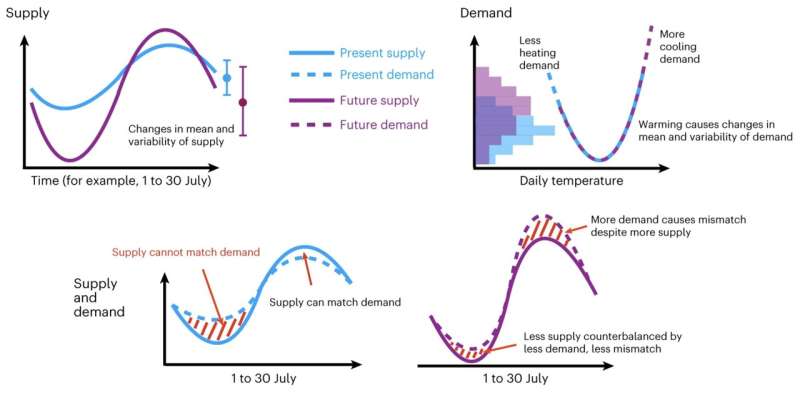New research investigates the influence of climate change on the availability and consumption of wind and solar energy

August 4, 2023 feature
This article has been reviewed according to Science X's editorial process and policies. Editors have highlighted the following attributes while ensuring the content's credibility:
- fact-checked
- peer-reviewed publication
- trusted source
- proofread
by Ingrid Fadelli , Tech Xplore
Over the past few decades, sustainable energy solutions that rely on renewable sources, particularly the sun and wind, have become increasingly advanced and widespread. Many countries worldwide have committed to drastically lowering carbon emissions in the next decade or so, and these technologies will prove crucial in achieving this.
Estimates by the International Energy Agency (IEA) suggest that by 2050 wind and solar energy technologies could contribute to the generation of approximately 62% of the world's energy. Recent studies showed that the supply and demand of both wind and solar energy could be adversely impacted by climate change, however.
In terms of supply, most wind and solar energy solutions are highly dependent on the weather, therefore unexpected meteorological events can adversely impact their ability to generate energy. In terms of demand, global warming can increase the need for cooling equipment and reduce the need for heating, and extreme peaks in temperature (e.g., heat waves or very cold weather) can prompt sudden surges in the global energy demand.
Researchers at Peking University, Brown University and other institutes worldwide recently carried out a study aimed at better understanding how climate change can affect the planning of supply and demand for wind and solar energy. Their paper, published in Nature Energy, highlights the need for the energy sector to devise interventions that could address potential issues that could arise as a result of climate change.
'Inspired by China's carbon-neutrality goal, we stepped into the field of energy research,' Laibao Liu, one of the researchers who carried out the study, told Tech Xplore. 'So, we start our energy research with focusing on China's wind and solar energy. Then, we look further into the whole globe and aim to evaluate the climate change risk on global wind and energy systems.'
As part of their study, Liu and his colleagues analyzed the daily outputs of climate simulations based on 12 state-of-the-art global climate models (GCMs). These are models that predict climatic processes, representing them on a 3D grid placed over a map of the world.
The 12 models used by the researchers were developed as part of a research endeavor known as the Coupled Model Intercomparison Project Phase 6 (CMIP6). The team considered the present climate, in the form of climate simulations spanning from 1985 to 2014, as well as predictions of the future climate (from 2041 to 2100).
Overall, the results of their analyses suggest that by the end of this century energy systems with varying dependence on wind and solar energy could experience significant reductions in the supply–demand match due to climate change. The smaller or more variable supply of renewable energy could particularly affect this match at middle to high latitudes.
Interestingly, the team also found that in some regions, reduced demands for heating as a result of global warming could alleviate or reverse these effects. At lower latitudes, on the other hand, although the supply of solar energy could be greater, cooling demands could increase drastically due to unbearably high temperatures, adversely affecting the matching between supply and demand.
'We utilized future climate information projected by state-of-the-art global climate models and build a new framework in the assessment,' Liu explained. 'Based on our results, we suggest for energy system planners to take future climate change information into account, otherwise, they might experience power outages due to unprecedented climate risk.'
The recent study by Liu and his colleagues offers some general estimates of the possible effects that climate change could have on the wind and solar energy sector in the future, particularly on the relationship between the supply and demand of energy. These findings could serve as a warning for energy suppliers and researchers, encouraging them to devise new viable solutions to mitigate the adverse effects of climate change and unpredictable weather on the supply–demand of renewable energy.
'In our next studies, we might also focus on periods when the energy deficit occurred,' Mengxi Wu, another researcher involved in the study, added.
© 2023 Science X Network




